What do 350,000 deaths look like?
For more than 10 months, we’ve struggled to understand the human toll of the COVID-19 pandemic in the United States. Even if we can comprehend the readily-available death counts, how could we begin to visualize such loss? As a line graph? Lost productivity? As freezer trucks full of bodies, or empty places at dinner tables?
Coronavirus case spikes have brought day after day of 9/11-sized mortality numbers, relentless waves pounding a weary shore. In the scarcely visible wake, there are people surviving, saying goodbye, and struggling to move on.
Last March, while the novel coronavirus was spreading across the U.S., Alex Goldstein opened a Twitter account called @FacesOfCOVID, where he began to post daily obituaries from across the country of Americans lost to the virus. For hours from his Boston home each evening, he would scour the news to prepare unique memorial tweets for the next day.
Goldstein’s Twitter account has provided — at least for a segment of social media users — human context for the COVID-19 death statistics that stack up daily. For many distraught families, the account has afforded a method for grieving after they’ve been denied the ability to celebrate their late loved ones in person.
Faces of COVID has featured firefighters, poets, nurses, priests, veterinarians, students, entrepreneurs, immigrants, parents, children, and incarcerated people in the account’s more than 4,000 posts. These are the stories of three of them, relayed by their loved ones.
Lauryne Noecker
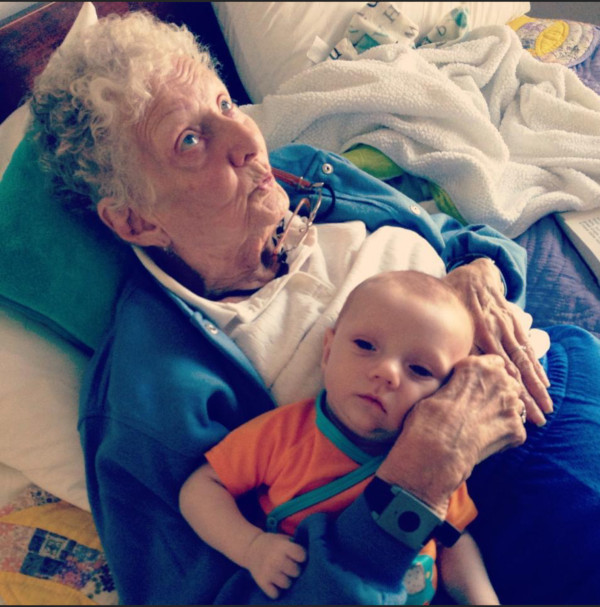
Lauryne Gauthier had just returned home from her job as a government toxicologist, and she sat with her seven-year-old son in her lap. He was groaning and cooing due to a rare genetic condition that causes daily gelastic seizures.
Her grandmother (and namesake) Lauryne Noecker, had died in early November.
“I wasn’t able to tell her this,” she told me over the phone, “but I asked my parents to relay the message. Who I am as a mother — as Zy’s mother — I owe to her one hundred percent. It’s not easy with Zy; at one point he was having seventy-five seizures a day. I have been able to find beauty in all of it, because of her.”
Lauryne Phyllis Noecker was born in Baltimore in 1928. Her parents divorced early on, and she was raised in Washington, D.C. by her mother, Gladys Montier, who was a clerk for several Democratic congressmen, including Phillip Hart and Robert F. Kennedy. Montier even had a small role in Otto Preminger’s 1962 film Advise & Consent. “Everybody said she was one of the meanest women they’d ever met!” Gauthier says, as she never had the opportunity to meet her great-grandmother.
Noecker was reportedly “stunning” as a young adult, and wanted to be a model. Instead, she married and gave birth to six children. Like her mother, Noecker, too, divorced from her husband after his failure to provide for their family left her feeling depressed and helpless. He had also found someone else. She was left to raise her children — and, practically, many of her children’s friends — on her own in El Paso. She developed a strong sense of thrift and an uncompromising will to make it work.
“Looking back on her schedule, now, it’s hard to believe she did it all,” Gauthier says. Noecker became a lunchlady — her first ever full-time job — and later worked nights at a computer plant. She took in neighborhood kids from time to time and provided for them without question. Noecker leaves behind a family who is breathless with unique stories illustrating her grit and resilience. Once, a family friend gave them a pet rabbit, and Noecker served it that night for dinner. Another time, she was almost arrested for stealing a package of hot dogs.
In El Paso, Gauthier lived with her grandmother — along with her mother and stepdad — for a time. They were buddies, and Gauthier was enchanted by her Grandmother Noecker’s impeccable wit. She swears her grandmother could have gone toe-to-toe with the comics they watched together on Def Comedy Jam (though Noecker’s favorite standup comic was George Carlin). Even in her old age, Noecker loved bright, flamboyant fashion. She traveled to Vegas with a friend to see drag shows, and she strutted around in a pair of metallic Adidas sneakers given to her from another granddaughter in Portland. She loved sexy firefighter calendars.
“She was extraordinary, one-of-a-kind, out of this world … ” Gauthier struggles to define her grandmother in a way that feels significant enough. What was it about Grandma Noecker that made her shine so bright that everyone around felt privileged to know her? It seems as though she took her tearjerker life and turned it into a comedy, finding humor in the most devastating situations.
Gauthier was able to FaceTime her grandmother the day before she passed, and Noecker gave her a smile that she’ll always remember, but she said, “It’s a very barbaric feeling to say goodbye over a device … I have not hugged a single person who knew her.”
At the time of her death, it seemed that Noecker had succumbed to pneumonia, narrowly avoiding the recent uncontrolled spread of the coronavirus pandemic. After all, she was 92 years old and twice tested negative for COVID-19 after she became sick.
The family had made arrangements to fulfill one of Noecker’s long-held last wishes — to donate her body to scientific study — and it appeared that a lab in Baltimore would accept the remains, giving Grandma Noecker a final return to her birthplace. The discovery of COVID-19 in her body added layers of confusion and regret to grief as the family retraced her care and bore the weight of wondering how she may have contracted it.
“She was robbed of her plan to donate her body to science due to a positive postmortem COVID-19 test,” Noecker’s daughter Deborah wrote in a message. “The rejection of her beautiful — and what we thought was disease-free — body, changed what I expected to feel as I grieved into a numb anger. She thought her death would have meaning. Her COVID-19 ashes were cremated and returned in a cardboard box.”
“I think [the pandemic] is going to have long-lasting effects on mental health for many of us because of emotions we haven’t dealt with,” Gauthier says. Their family is spread out around the country, and she says the lack of a physical memorial service for Noecker has left them fractured, tending to their own purgatorial grieving processes. “I imagined losing her over and over again, and it was never supposed to happen this way.”
Gauthier fondly remembers her grandmother’s twisted sense of humor, though, how Noecker’s “no-bullshit” approach to her life liberated her to laugh through hardships.
She recalls that Noecker read or watched the news every day, enthralled by the big stories that kept everyone’s attention. “I think — I think there’s a little part of her that would’ve loved that she was a part of this,” Gauthier admits, in reference to the pandemic. “Oh, that sounds terrible, doesn’t it!”
Jimmy Ramos
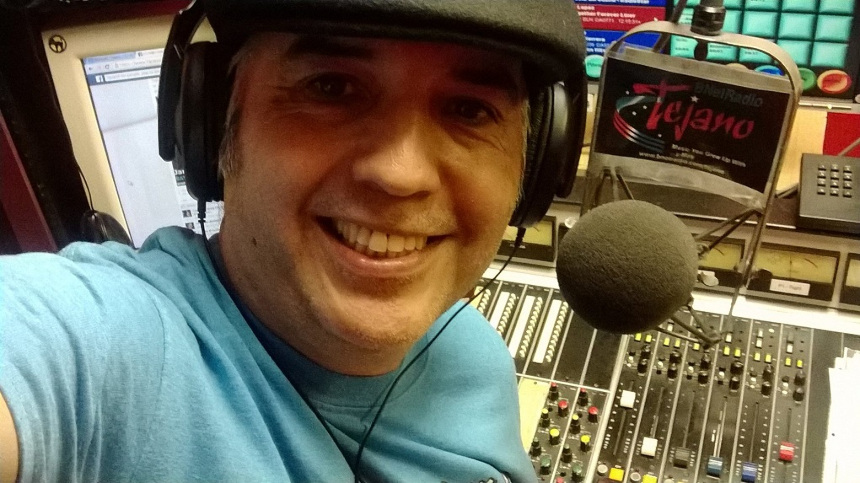
Rosanna Ramos-Tenorio remembers when her older brother Jimmy was learning to play the trumpet as a child. “We would tell him to play in the garage because he made so much noise,” she says. But he improved, and eventually their family grew to appreciate his playing. He would blow his horn along to Chuck Mangione or Herb Alpert. Ramos-Tenorio says her brother was always playing Alpert’s song “Rise,” a slow, funky disco single with a long cascading trumpet solo that sounds dreamy and celebratory.
Jimmy Ray Ramos was born on November 9, 1964. His middle name was supposed to be spelled “Rey,” but the nurse’s misspelling took. He grew up in a house on Waxahatchie Street in a Hispanic neighborhood in Houston, the eldest of four siblings, including Rosanna’s identical twin Rosalie and their younger brother Joshua. Their father worked as an electrician at an oil refinery and their mother worked in a Maxwell House plant.
Jimmy took to music like his father, a guitarist who played with big names like Freddy Fender. Rosanna says that while their father played music only by ear, Jimmy learned to read sheet music as well. He picked up many instruments and music genres along the way: drums, guitar, bass, blues, jazz, Tejano. “He just loved music,” Ramos-Tenorio says, “all styles of music. He was a musician.”
They attended Catholic school, and after graduation Jimmy joined the Air Force. While he was stationed in Frankfurt, Germany, Rosanna and her twin sister traveled there to visit him for a couple of weeks over Christmas. “It was the best Christmas of my life,” she says. “I saw beautiful snow like I’d never seen in Texas. He took us to see castles.” The twins both joined the Air Force after high school. “We were always copying Jimmy,” she says, from childhood into adulthood. Rosanna saw her older brother as both a role model and a protector for his younger siblings.
Jimmy earned his bachelor’s degree in political science at the University of Houston and his master’s in education at University of Houston-Clear Lake. He became a high school Spanish teacher. He had two sons, Paul, 20, and Matthew, 17. On weekends and evenings, he played music with any number of bands — a recent one was called Latin Breed — and he deejayed on BNet Radio, a Tejano internet station. Jimmy’s encyclopedic knowledge of Latin music spanned generations, and it allowed him to bridge age gaps on his show. He frequently interviewed local community activists and musicians. Rosanna would call in often to request music she could dance to, like Selena. He also served as a Catholic school principal and an interpreter, and he was active in his church, The Catholic Charismatic Center in Houston.
On April 14th, Rosanna received a call early in the morning from Jimmy’s ex-wife Lucero. When she answered, she says she heard screaming, and “Jimmy is dead” and “he had COVID.” She was shocked; Rosanna had no idea Jimmy was even sick. Just a few days before, she learned, her brother went to get tested with his son Paul. Jimmy tested positive, while Paul tested negative. Jimmy also had Type II diabetes and high blood pressure. Within a few days, he was found dead sitting in a chair in his apartment.
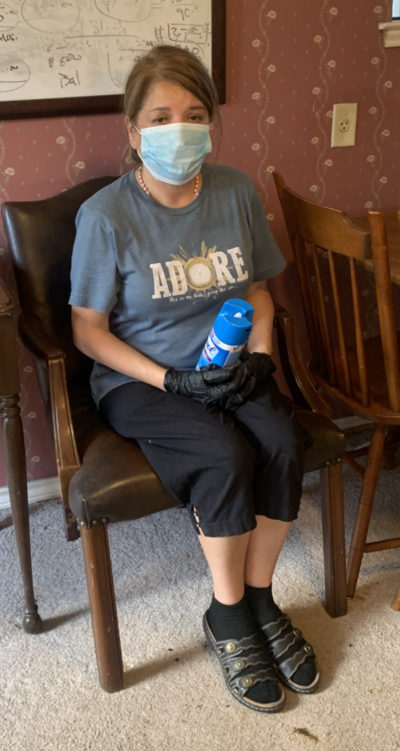
“Everything is happening so fast, all I’m thinking about is, what are they going to do with Jimmy’s body?” Rosanna says. “I was seeing all of these bodies going into freezer trailers up in New York, and I was thinking, what are they going to do with my brother’s body?”
Rosanna threw on some clothes and rode with her son and daughter to her parents’ house to tell them about Jimmy: “I knocked on their window to wake them up, got them to the kitchen table, and told my daughter to hold onto my mom and my son to hold on to my dad, and then I told them, I said ‘Jimmy died. He had COVID.’ I just held onto my mom as hard as I could. They were devastated … couldn’t believe it. It was like a shock … I feel like half of my dad’s heart and half my mom’s heart died.”
They had to cremate Jimmy’s remains, but they were able to keep them at the funeral home until their church could open for a mass. Rosanna wasn’t necessarily surprised that Jimmy would hide his positive COVID test from family, not wanting them to worry, but she was surprised at how quickly it killed him. The prospect of a virus travelling across the world to Texas and ending Jimmy’s life feels to Rosanna like a surreal nightmare. “It hits people in different ways, but it killed my brother,” she says. I hate COVID. I hate it.”
At Jimmy’s apartment, Rosanna went through his bookshelf, full of all kinds of books on philosophy, religion, and music. She resolved to keep just one of them: a Bible. Later on, when she leafed through it, she saw that the only place he had made any marks was in the book of John. Rosanna says Jimmy never knew it, but John is her favorite book of the Bible, and she named her son after it. She opened Jimmy’s Bible to John and read a passage he had underlined: “ … For I have come down from heaven not to do my own will but the will of Him who sent me, and this is the will of Him who sent me: that I should lose nothing of all those that He has given me, but raise them up at the last day. For this is the will of my Father: that everyone who sees the Son and believes in him will have eternal life, and I will raise him up on the last day.”
“I felt like he was talking to me, saying ‘I have eternal life,’” Rosanna says. “It’s just so strong. It hits me straight in the heart, and that’s what gives me strength … it’s very comforting, because he’s not dead. I’m sorrowed by the passing, not seeing him, but at the same time, there’s a very powerful strength that keeps me saying, I’ve got to keep going, I can’t just sit in a corner and let life go by. No. I have to rise, like that song he used to play… the scripture that he underlined was meant for me, to have. I know that for a fact.”
Linda Benson
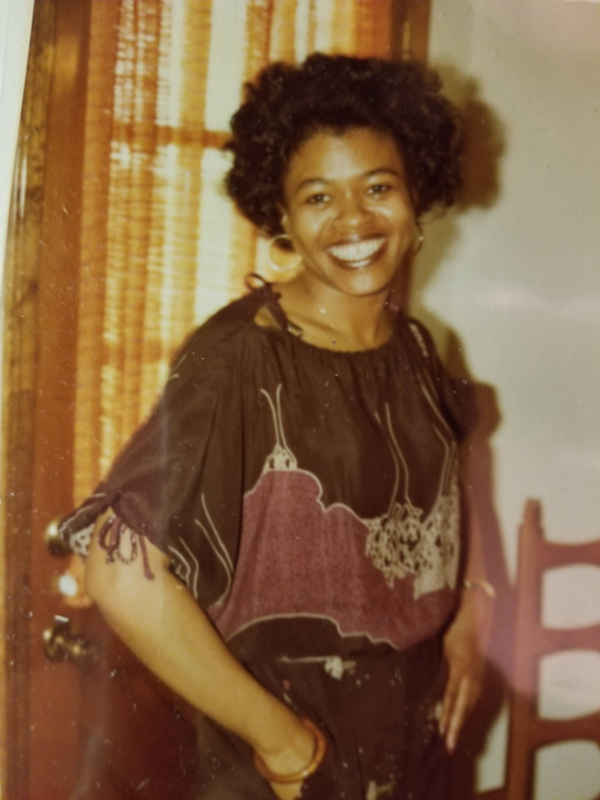
Lynnetta Ford was able to spend 55 years with her mother, Linda Benson, but she still discovers small details about her mother’s life that Benson never talked about. She sits with Benson’s yearbook from Douglass High School, reading off her extracurriculars: pep club, treasurer of Y-Teens (a YWCA program), state honor roll, Red Cross volunteer work, Future Business Leaders of America. Ford also recently discovered that her mother sang in the youth choir as a girl at her church. “She didn’t brag about her accomplishments,” Ford says.
Linda Darnell Webb Benson was born in Oklahoma City on July 10, 1946. The youngest of five siblings, her parents met in Oklahoma after settling there from elsewhere: her father from Louisiana and her mother, a domestic worker, from Montgomery. Ford describes her mother as humble and quiet from the beginning, but always busy in her school and community.
Benson attended high school at the tail end of de facto school segregation in Oklahoma City. Douglass was one of the only schools in the city for African Americans. When she was a teenager, her older sister took her to a civil rights protest downtown, and Benson told her daughter she was so overwhelmed with it that she sat on the curb and cried. In those years, activist Clara Luper organized many acts of civil disobedience throughout Oklahoma City to integrate diners, theaters, and drug stores.
One year after she graduated, in 1965, her daughter was born, and Ford attended school while Oklahoma City instituted bussing to integrate schools. While Benson worked weeknights at Western Electric (now AT&T), Ford stayed with her grandparents in a primarily Black neighborhood, catching an early bus each morning to attend a white school.
Both Ford and her brother Christopher, who is 21 years younger, grew up with their mother as though they were each an only child. She remembers weekend trips to Texas, Tulsa, California, or the Arbuckle Wilderness, a drive-through zoo. Her brother says such weekend trips were “some of the most peaceful times in his life.” Benson kept them busy, too. For Ford, gymnastics and swimming lessons. For her brother, drum lessons and judo. “My brother and I were very lucky … there was always unconditional love, a lot of patience.”
Benson loved to go to the movies. She listened to jazz and R&B, and she was humble about her cooking. “She was critical of her own cooking,” Ford says, “saying it wasn’t as good as her mom’s, and I’m the same way, saying it isn’t as good as what she would fix.” She remembers her mother’s excellent meatloaf, ribs, bread pudding, and apple pie. In spite of her shyness, Ford says that Benson “made friends wherever she was,” whether at work or at St. John Missionary Baptist Church, where she attended for 66 years. She voted Democrat, Ford says, but she wasn’t loud about it. “She had a gorgeous smile and kind eyes that just lit up the room.”
For 34 years, Benson worked at the Oklahoma Publishing Company (publisher of The Oklahoman) in the classified advertising department. Ford remembers visiting when she was younger, and seeing her mother’s rapport with her coworkers in the smoke-filled newsrooms. As a teenager, Ford got a summer job there working in circulation.
In recent years, Benson’s health began to fail. She had a minor stroke, hip and knee replacements, and then she was diagnosed with mild dementia. Ford moved her mother into her house in 2017.
Fall of 2020 was a trying time for Ford and her husband. First, his mother died from COVID-19 in October. Then, Ford got sick, tested positive, and was hospitalized for six days with pneumonia. Since local hospitals were full, she was sent to Enid, Oklahoma. The day she returned home, they called an ambulance for her mother after Benson complained of breathing problems.
“The paramedics took her out, and I told her ‘I love you, mama,’” Ford says, “but, once her condition started deteriorating, I wished I had hugged her.”
Benson was in the hospital for almost three weeks. Doctors first increased her oxygen, then put her on a BiPAP machine, and finally a ventilator. She couldn’t take Remdesivir, the drug that had helped Ford overcome it, because of liver problems. After a few days, Benson’s condition continued downhill, and doctors told Ford she was unlikely to recover from the damage to her lungs and kidneys. Ford made the decision to take her mother off the ventilator.
Her daughter Alainna set up a Zoom call so that Benson’s family and friends could tell her how much she meant to them. Ford was allowed to sit by her mother’s bed to hold her hand. Watching her mother’s body “gasping for breath” is a difficult memory that Ford says she will never forget, but she felt lucky to have the opportunity to give her a final hug.
Become a Saturday Evening Post member and enjoy unlimited access. Subscribe now
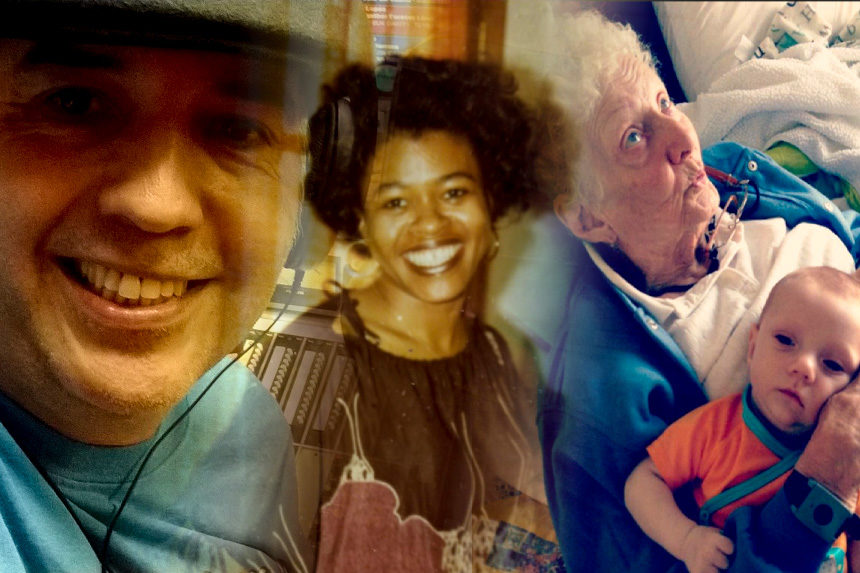
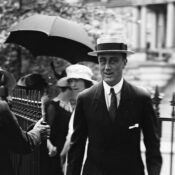
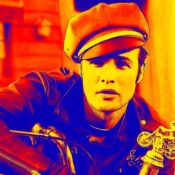
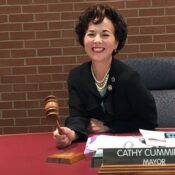
Comments
I really enjoyed your stories about the people who have died from the virus. It puts a face on this disease. I hope that will encourage people to do their part to help stop the spread of it.
it is so sad to hear that these people has lost their family because of COVID19
All of these stories along with the pictures of the victims bring to light the devastation of this dreaded virus…It brings to mind another era that also took many lives and that was Aids. This one is very aggressive and everyone is at risk..It perplexes me as to why so many think that they will not get it and don’t bother to take the precautions to protect themselves, loved ones and the others of whom they will come in contact with. I have to thank the author who took the time to chronicle these cases and bring our attention to it…